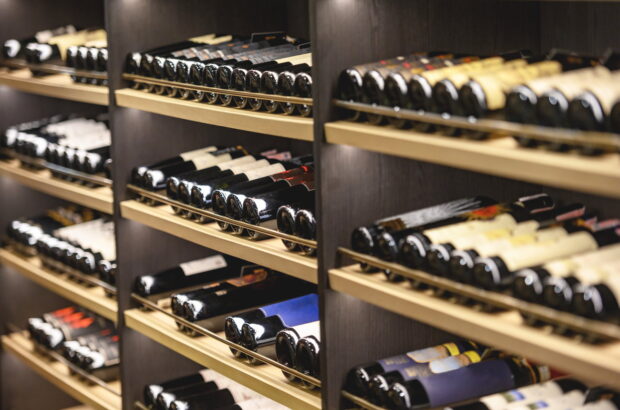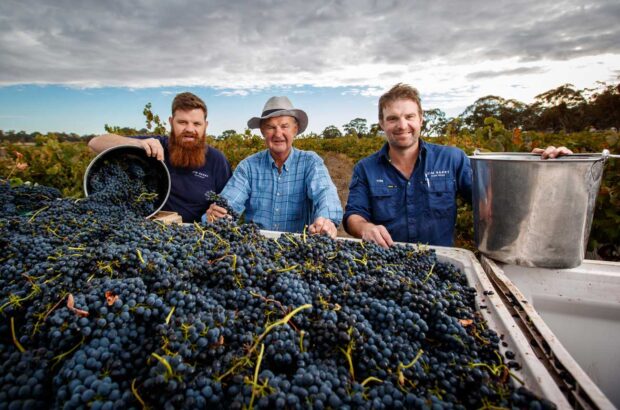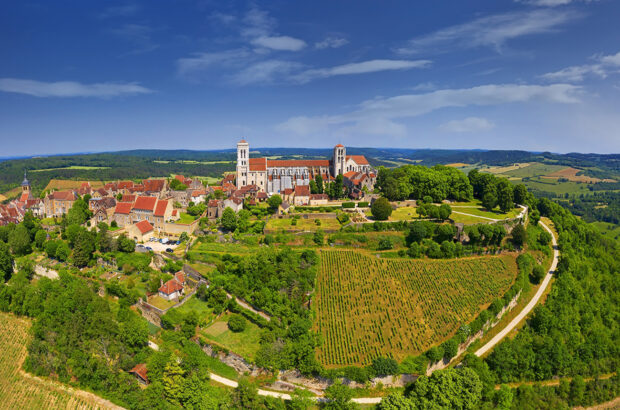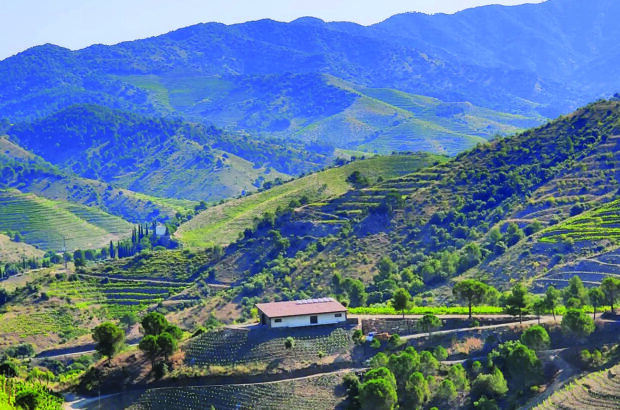The Thermenregion stretches southwest from Vienna and includes the spa towns of Bad Vöslau and Baden.
Its most famous wine village is Gumpoldskirchen, which used to produce rich and long-lived wines, often with considerable sweetness, but the style has fallen out of fashion, though such wines can still be found.
Its main local white varieties are Zierfandler and Rotgipfler, both names something of a mouthful for English- and non-English speaking wine enthusiasts.
Scroll down to see tasting notes and scores for five Zierfandler wines worth seeking out
Nonetheless, they are both of considerable interest and deserve to be better known – a separate article on Rotgipfler will follow.
{"content":"PHA+QWx0aG91Z2ggaW5kaWdlbm91cyB0byB0aGUgcmVnaW9uLCB0aGUgdmFyaWV0aWVzIGNvdWxkIGhhcmRseSBiZSBtb3JlIGRpZmZlcmVudC4gWmllcmZhbmRsZXIgaXMgbGF0ZS1yaXBlbmluZyBhbmQgaGFzIGhpZ2ggYWNpZGl0eSwgZ2l2aW5nIGl0IGEgUmllc2xpbmctbGlrZSBzdHJ1Y3R1cmUgYW5kIGNvbnNpZGVyYWJsZSBsb25nZXZpdHkuPC9wPgo8cD48ZGl2IGNsYXNzPSJhZC1jb250YWluZXIgYWQtY29udGFpbmVyLS1tb2JpbGUiPjxkaXYgaWQ9InBvc3QtaW5saW5lLTIiIGNsYXNzPSJpcGMtYWR2ZXJ0Ij48L2Rpdj48L2Rpdj48L3A+CjxwPlJvdGdpcGZsZXIsIGluIGNvbnRyYXN0LCByaXBlbnMgZWFybGllciwgYW5kIGl0cyBmbGF2b3VyIHByb2ZpbGUgaXMgcGFja2VkIHdpdGggaGludHMgb2YgdHJvcGljYWwgZnJ1aXQsIHdoaWxlIGl0cyBwbHVtcCB0ZXh0dXJlIGlzIHRvdGFsbHkgdW5saWtlIHRoZSByYXBpZXItbGlrZSBaaWVyZmFuZGxlci48L3A+CjxwPkJvdGggdmFyaWV0aWVzIGhhdmUgdGhlaXIgcGFydGlzYW5zLCBhbmQgSSYjODIxNzttIGFuIGVudGh1c2lhc3QgZm9yIHRoZSByYWN5IFppZXJmYW5kbGVyIG92ZXIgdGhlIGZhdHRlciwgbW9yZSBvcHVsZW50IFJvdGdpcGZsZXIuPC9wPgo8cD5Ib3dldmVyLCB0aGVyZSBpcyBubyBuZWVkIHRvIGNob29zZSwgYXMgdGhlIEd1bXBvbGRza2lyY2hlbiB0cmFkaXRpb24gd2FzIHRvIGJsZW5kIHRoZSB0d28sIHRoZSBhY2lkaXR5IG9mIHRoZSBmb3JtZXIgY3V0dGluZyB0aGUgcGx1bXBuZXNzIG9mIHRoZSBsYXR0ZXIuIE5hdHVyYWxseSwgdG8gY29uZnVzZSBjb25zdW1lcnMgZXZlbiBtb3JlLCBaaWVyZmFuZGxlciwgd2hlbiBibGVuZGVkLCBpcyB1c3VhbGx5IGtub3duIGFzIFNww6R0cm90LCBnaXZpbmcgYSB3aW5lIGNhbGxlZCBTcMOkdHJvdC1Sb3RnaXBmbGVyLjwvcD4KPGRpdiBjbGFzcz0iYWQtY29udGFpbmVyIGFkLWNvbnRhaW5lci0tbW9iaWxlIj48ZGl2IGlkPSJwb3N0LWlubGluZS0zIiBjbGFzcz0iaXBjLWFkdmVydCI+PC9kaXY+PC9kaXY+CjxwPkl0JiM4MjE3O3Mgc3RpbGwgcHJvZHVjZWQg4oCTIHRoZXJlIGFyZSBnb29kIGV4YW1wbGVzIGZyb20gUmVpbmlzY2ggYW5kIFN0aWZ0IEtsb3N0ZXJuZXVidXJnICYjODIxMTsgYnV0IHRoZSB0cmVuZCBmb3Igc29tZSB0aW1lIGhhcyBiZWVuIHRvIG1ha2UgbW9ub3ZhcmlldGFsIHdpbmVzLiBEZXNwaXRlIHRoZSBmcmVxdWVudCBzd2VldG5lc3Mgb2YgbXVjaCBSb3RnaWZsZXIsIFppZXJmYW5kbGVyIGlzIG5vIHNsb3VjaCBpbiB0aGUgc3dlZXRuZXNzIHN0YWtlcywgYW5kIGluIGNlcnRhaW4geWVhcnMgY2FuIHByb2R1Y2UgVEJBcyBvZiBzZWFyaW5nIHB1cml0eSBhbmQgZnJlc2huZXNzLjwvcD4KPGRpdiBjbGFzcz0iYWQtY29udGFpbmVyIGFkLWNvbnRhaW5lci0tbW9iaWxlIj48ZGl2IGlkPSJwb3N0LWlubGluZS00IiBjbGFzcz0iaXBjLWFkdmVydCI+PC9kaXY+PC9kaXY+CjxwPlppZXJmYW5kbGVyIGlzIG5vdCB0aGF0IGVhc3kgdG8gZ3Jvdy4gUGlja2VkIHRvbyBlYXJseSwgYW5kIHRoZSBhY2lkaXR5IGNhbiBiZSBhZ2dyZXNzaXZlOyBvdmVyY3JvcHBlZCwgYW5kIGl0IGNhbiBiZSBuZXV0cmFsLiBJdCBhbHNvIGJlbmVmaXRzIGZyb20gYm90dGxlIGFnZS4gUmV0aWNlbnQgaW4gaXRzIHlvdXRoLCBaaWVyZmFuZGxlciBjYW4gYmUgdGVuc2UgYW5kIHJpZ2lkIGJlZm9yZSBvcGVuaW5nIHVwIGFmdGVyIGEgZmV3IHllYXJzIHRvIHNob3cgZ3JlYXQgY29tcGxleGl0eS48L3A+CjxwPkl0JiM4MjE3O3Mgbm90IGp1c3QgdGhlIG5vbWVuY2xhdHVyZSB0aGF0IHByZXZlbnRzIHRoZXNlIHdpbmVzIGZyb20gYmVpbmcgYmV0dGVyIGtub3duLiBUaGUgc3VyZmFjZSBwbGFudGVkIHdpdGggYm90aCBpcyBzbWFsbCwgc28gcHJvZHVjdGlvbiBhbmQgZGlzdHJpYnV0aW9uIGFyZSBsaW1pdGVkLiBBbHNvLCB0aGUgVGhlcm1lbnJlZ2lvbiBpcyB3ZWxsIHN0b2NrZWQgd2l0aCBIZXVyaWdlbiAod2luZSB0YXZlcm5zKSBzbyBtdWNoIG9mIHRoZSB3aW5lcyBhcmUgY29uc3VtZWQgYnkgdGhpcnN0eSBsb2NhbHMgb3IgVmllbm5lc2Ugb24gYSBkYXkgdHJpcC4gRm9ydHVuYXRlbHksIHRoZSB3aW5lcyB0aGF0IGZpbmQgdGhlaXIgd2F5IGludG8gYm90dGxlIHRlbmQgdG8gYmUgb2Ygc3VwZXJpb3IgcXVhbGl0eS48L3A+CjxkaXYgY2xhc3M9ImluamVjdGlvbiI+PC9kaXY+CjxwPlppZXJmYW5kbGVyIGlzIGxpa2VseSB0byByZW1haW4gYSBuaWNoZSB3aW5lLCBhbmQgU3DDpHRyb3QtUm90Z2lwZmxlciBldmVuIG1vcmUgc28uIERpc3RyaWJ1dGlvbiBvdXRzaWRlIEF1c3RyaWEsIGV2ZW4gb3V0c2lkZSB0aGUgcmVnaW9uLCByZW1haW5zIGxpbWl0ZWQsIGFsdGhvdWdoIHRoZSB3aW5lcyBkbyBoYXZlIGFuIGFyZGVudCwgaWYgbGltaXRlZCwgZm9sbG93aW5nLiBUaGF0IGRvZXMgbm90IG1lYW4gdGhleSBhcmUgbm90IHdvcnRoIHNlZWtpbmcgb3V0LiBaaWVyZmFuZGxlciB3aWxsIGFwcGVhbCB0byB0aG9zZSB3aXRoIHJlbGF0aXZlbHkgY2xhc3NpYyB0YXN0ZXMgd2hlbiBpdCBjb21lcyB0byBmbGF2b3VyIGFuZCBzdHJ1Y3R1cmUgaW4gd2hpdGUgd2luZXMgKGFsdGhvdWdoIEhlaW5yaWNoIEhhcnRsIGRvZXMgcHJvZHVjZSBhbiBpbnRyaWd1aW5nICYjODIxNjtvcmFuZ2UmIzgyMTc7IHdpbmUgZnJvbSB0aGUgZ3JhcGUpOyBSb3RnaXBmbGVyIGFuZCB0aGUgYmxlbmRzIG9mZmVyIGFuIGV4b3RpY2lzbSByZW1pbmlzY2VudCBvZiBhIHZlcnkgcmlwZSBQaW5vdCBHcmlzIGZyb20gQWxzYWNlLiBJdCYjODIxNztzIHRlbXB0aW5nIHRvIGNsaW5nIHRvIHRoZSB0cmllZCBhbmQgdGVzdGVkIOKAkyBhbmQgaW4gQXVzdHJpYSB0aGF0IHVzdWFsbHkgbWVhbnMgR3LDvG5lciBWZWx0bGluZXIg4oCTIGJ1dCBpdCBjYW4gYmUgbW9yZSByZXdhcmRpbmcgdG8gc3RyYXkgaW4gdGhlIGRpcmVjdGlvbiBvZiBsb2NhbCBzcGVjaWFsaXRpZXMuPC9wPgo8cD4K"}
See tasting notes and scores for five Zierfandler wines worth seeking out
{}
{"wineId":"61052","displayCase":"standard","paywall":true}
{"wineId":"61053","displayCase":"standard","paywall":true}
{"wineId":"61054","displayCase":"standard","paywall":true}
{"wineId":"61050","displayCase":"standard","paywall":true}
{"wineId":"61051","displayCase":"standard","paywall":true}
{}
Related content












